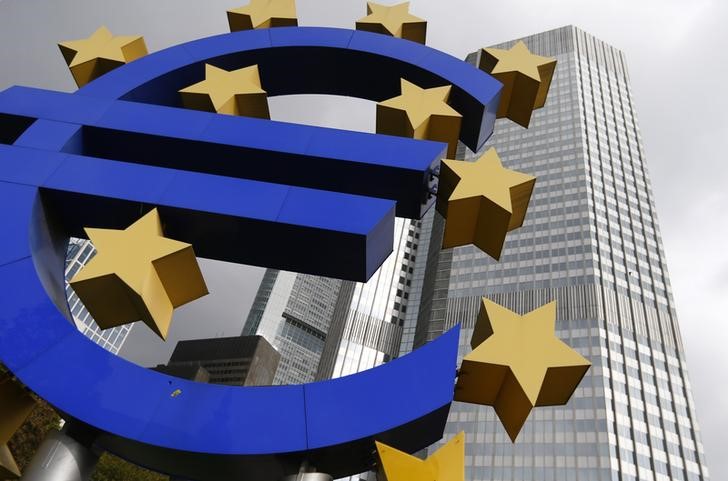By Thomas Atkins and Stefano Bernabei
FRANKFURT/ROME (Reuters) - After subjecting European banks to year-long "stress tests" of their balance sheets, the European Central Bank is now planning a deeper examination to see whether their businesses are sufficiently profitable, efficient and well-run.
For lenders in crowded markets such as Germany and Italy, this "business model review" may prove a tougher one to pass, raising pressure on weaker players to consolidate, increase capital, cancel dividends or alter how they operate.
Banks with political sponsors are likely to oppose such scrutiny, but the pressure to overhaul the sector is growing as the outlook for the euro zone economy worsens.
"When we review the capital plans of the banks with a shortfall now it's totally about business model, it's the most important dilemma," Daniele Nouy, head of the ECB's Single Supervisory Mechanism, or SSM, the body charged with overseeing the banks, told Reuters this week.
Nouy has already told banks to start selling off weak operations in preparations for the model tests, saying regulators would focus first on sustainable profits.
The International Monetary Fund estimated a few weeks ago that nearly three quarters of euro zone banks need to significantly change their business models to meet the demand for credit when the economy recovers.
"This has been a very sensitive topic. The banks definitely don't like it but the power is with the regulator now," said Christian Thun, business strategist at Moody's Analytics. "They will just have to deal with it."
The ECB won't grab the steering wheel if a bank's business model has veered off course. Rather than insist a business is shut down or shrunk, it will highlight concerns and invite responses.
"Sometimes bankers use business plans where everything gets rosy in the future. We might challenge that but we will never dictate how banks should solve that," said Korbinian Ibel, a top SSM official, at a mid-November conference.
If anomalies persist, regulators have the right to require capital "add-ons" which could make some activities prohibitively expensive. They can also impose painful reporting requirements or even dismiss executives who fail to comply.
SHAMBLES
Although bankers may grumble, some acknowledge that the previous stress tests, which looked only at balance sheets, were not by themselves enough to pronounce the sector healthy.
"If you look at all the shambles that happened at banks in Italy ... they were all due to governance and the quality of human capital," said a senior Italian banker. "Capital was never an issue."
Italian banks were the biggest losers in the ECB stress tests, with 9 banks failing, including Italy's third largest bank and the world's oldest, Monte dei Paschi (MI:BMPS) with a 2.1 billion euro shortfall, brought low by a disastrous merger and a scandal of huge hidden derivatives trades.
"This will be a pre-emptive analysis by the ECB to understand what kind of beast it is dealing with," said another senior Italian banker.
Italy has one of the least-profitable bank sectors in the euro zone, with banks earning a paltry 0.17 percent return on assets. But Germany's, at 0.21 percent, is not much better.
With some 1,657 banks, Germany has a third of the European total. Many are too small to generate strong profits. Germany's banks are also among the least efficient, with a cost-to-income ratio of 73 percent, higher than every euro zone country except Austria.
Such flabby metrics leave banks vulnerable to crises or slumps, no matter how much capital they have accumulated.
State-controlled shipping financier HSH Nordbank [HSH.UL], for example, survived the stress tests thanks to government guarantees which cost it so much in fees it has few resources left to restructure and rebuild its capital base.
While only one German bank failed the ECB's stress tests, that figure would have risen to five if new capital rules that come into full force in 2019 were applied.

"The Bundesbank and (German markets watchdog) Bafin have never done this so deeply in this form," said KPMG partner Daniel Quentin, a former regulator at the German central bank, referring to the new ECB examinations.
(Additional reporting by Silvia Aloisi, Jonathan Gould, Carmel Crimmins, John O'Donnell; Editing by Peter Graff)